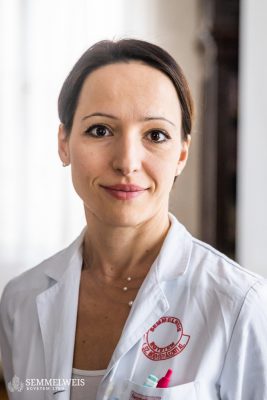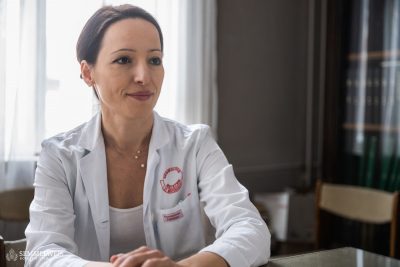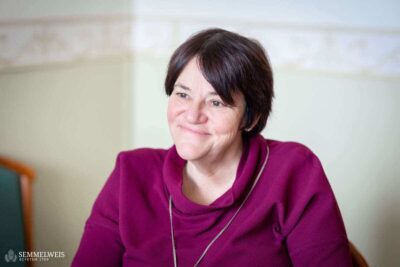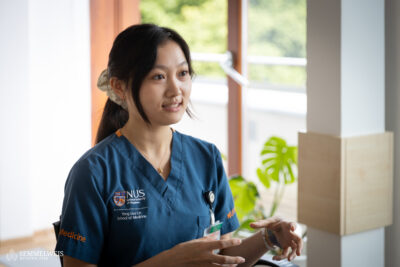In November 2022, three doctors from the Department of Obstetrics and Gynaecology at Semmelweis University obtained their specialist qualifications in gynaecological oncology, including Dr. Erzsébet Szatmári, a doctor at the Baross Street Department. She, together with her two colleagues who have just passed their exams, Dr. Sándor Nyíri and Dr. Richárd Tóth, has been working in this field of gynaecology, which is not very popular among doctors, for a long time.
Why did you find this difficult field so attractive?
I was originally interested in general surgery, but when I was a student there were very few women in this field. Having said that, I went to Semmelweis University’s 1st Department of Surgery because I loved the atmosphere there and I loved being in the operating theatre. However, my experienced surgeon friends advised me not to become a surgeon, because it is a very demanding and very competitive vocation, and for a woman it will not be easy or enjoyable to be among surgeons, most of whom are strong-minded and have a strong character. The idea was given to me to try gynaecology, which, although a real surgical profession, is less demanding and there are more and more female doctors in this field.
So I started a scientific student research group at the 1stDepartment of Obstetrics and Gynecology, and started doing small studies on gynaecological oncology. Then I got more and more involved in this world and finally I really applied to become a gynaecologist. The surgical treatment of gynaecological tumours has now evolved to the point where, in addition to operations on the uterus and ovaries, performing an extended abdominal surgery it is often necessary. And these operations require more surgical skill than a general obstetrician-gynaecologist has. For this reason, it was desirable to create a specialized training programme, which has been available in Hungary for 10 years. As I have been working continuously with women with cancer since I was a student and there is nothing else I would rather do, there was no question whether to take this specialization.
The existence of the specialization in gynaecological oncology is not yet well known in medical circles, as it is a relatively newly accepted specialization in Hungary, following international trends. Its practitioners have the surgical skills and oncological knowledge necessary for the surgical treatment of gynaecological tumours and are able to treat these patients much more effectively than their generalist colleagues.
What are the opportunities in Hungary today for those who want to get a qualification in this field?
I think the first and most important question is how attracted you are to this profession. Because you can only go down this path if you are undeterred. It is a physically, mentally and emotionally demanding vocation. And it can be done with joy and success only in a well-functioning team.
In Hungary too, those who follow this path can learn from world-renowned doctors. I do not know of another professor who would rather share his knowledge than Dr. László Ungár, and his best students – heads of the current surgical oncology centres – are likewise.
There are also plenty of opportunities to gain international experience. The European Society of Gynaecological Oncology (ESGO), for example, makes professional knowledge easily accessible to all its members through congresses, study tours, online courses and tutorials. The development of young doctors in training is their priority. Many of the members have very active professional and scientific lives and it is easy to find role models.
Do you think that as a woman you interact differently with your patients than your male colleagues? Could this be an advantage in doctor-patient communication or in the relationship of trust?
The diplomatic answer would be that all that matters is whether someone is a good doctor. But I cannot say that, because it is not true. Patient care takes many years and varies according to when and what is needed, but it is not usually limited to a single conversation or a single operation. Many times I am approached separately with intimate questions. I also sometimes find that patients are afraid to voice their insecurities in front of my male colleagues, but are reassured if they can vent in front of me. Some feel more comfortable when I do the physical examination. However, sometimes I find that a male presence, or even a bit of masculine humour, can help us through a difficult situation
How do patients react when they find out that such a young, fragile woman is going to operate on their malignant tumour?
It is rare, but it still happens that the new patient is a little shocked to admit that he or she never expected to be operated on by a woman. But I am not offended by that. After all, the image of the classic surgeon in all of our minds is typically that of a man. But once the important professional issues come to the fore, I think I will have the same confidence as my male colleagues. But there have also been several occasions when, for various reasons, patients have accepted only and exclusively female doctors.
The fragility issue is also deceptive. It’s not necessarily big, burly male surgeons who are good at marathon surgeries! On the other hand, one should strive to operate with good technique, not force.
Is it an advantage or disadvantage to be a woman in a surgical specialty today?
In my own collective I have never encountered discrimination, positive or negative, for being a woman. I am lucky because I have had the support of both my professors and my immediate superiors from the beginning. I feel treated as an equal. And my general impression is that the presence of women surgeons has become a natural part of all manual specialties and I know many highly respected women surgeons at international level who are outstanding performers.
I think it is optimal that we have a mixed team, because everyone has different strengths, but it is the overall effect that this team has. If I was the only woman in the team, I would probably have a bad time. A woman talks to another woman in a different way and sometimes that is necessary. Just as there is more agreement between men on certain issues, so they understand each other’s predicaments better. Fortunately, I know of several women doctors who have chosen this career and gone on to professional training. I see a gender balance being ensured.
What do you think about the future of your field?
The raison d’être of gynaecological oncology is unquestionable. It is now clear that the outcome of a disease is greatly reduced if it is not treated in a center with specific expertise in gynaecological cancer surgery. At international level, too, the criteria for a patient care unit to be considered a true centre are now being defined.
In Hungary we have started to move in this direction, but we are only at the beginning of the journey. At the moment we see the next most important step as the strict centralization of cancer care.
There has also been an explosion in the development of drug treatments for gynaecological cancers. And the combination of personalized surgical care and modern drug treatments could open up a whole new world. There are many questions to be answered and the field is bubbling.
What professional goals do you have?
In the short term, I want to acquire special skills in colposcopic examination of cervical lesions, and we want to set up a specialized unit for this. And in the medium to long term, the aim is to obtain a third specialization in clinical oncology, as the treatment of tumours with drugs is also evolving dynamically. This is no small task.
The Department of Obstetrics and Gynecology at Baross Street provides complex oncological care, i.e. we not only operate on patients, but also administer a wide range of drug treatments (chemo-, immuno-, hormonal and targeted therapies). Uniquely, the same nurses and doctors see patients, and because we know the patients well and see the disease in its progression, we approach the problem with complex knowledge.
You have two small children. How do you find balance between family and work?
My life became complete with the birth of my children. They are in school now. My husband is a very strong ally, but he is also a doctor and also works in surgery. So it’s not an easy situation. I’d be lying if I said that family and clinical life are always perfectly balanced. Sometimes there are extra difficulties, but as long as the circumstances allow, we will do our best to maintain a delicate balance between family and vocation for both of us.
Melinda Kiss
Translation: Rita Kónya
Photo: Bálint Barta – Semmelweis University




